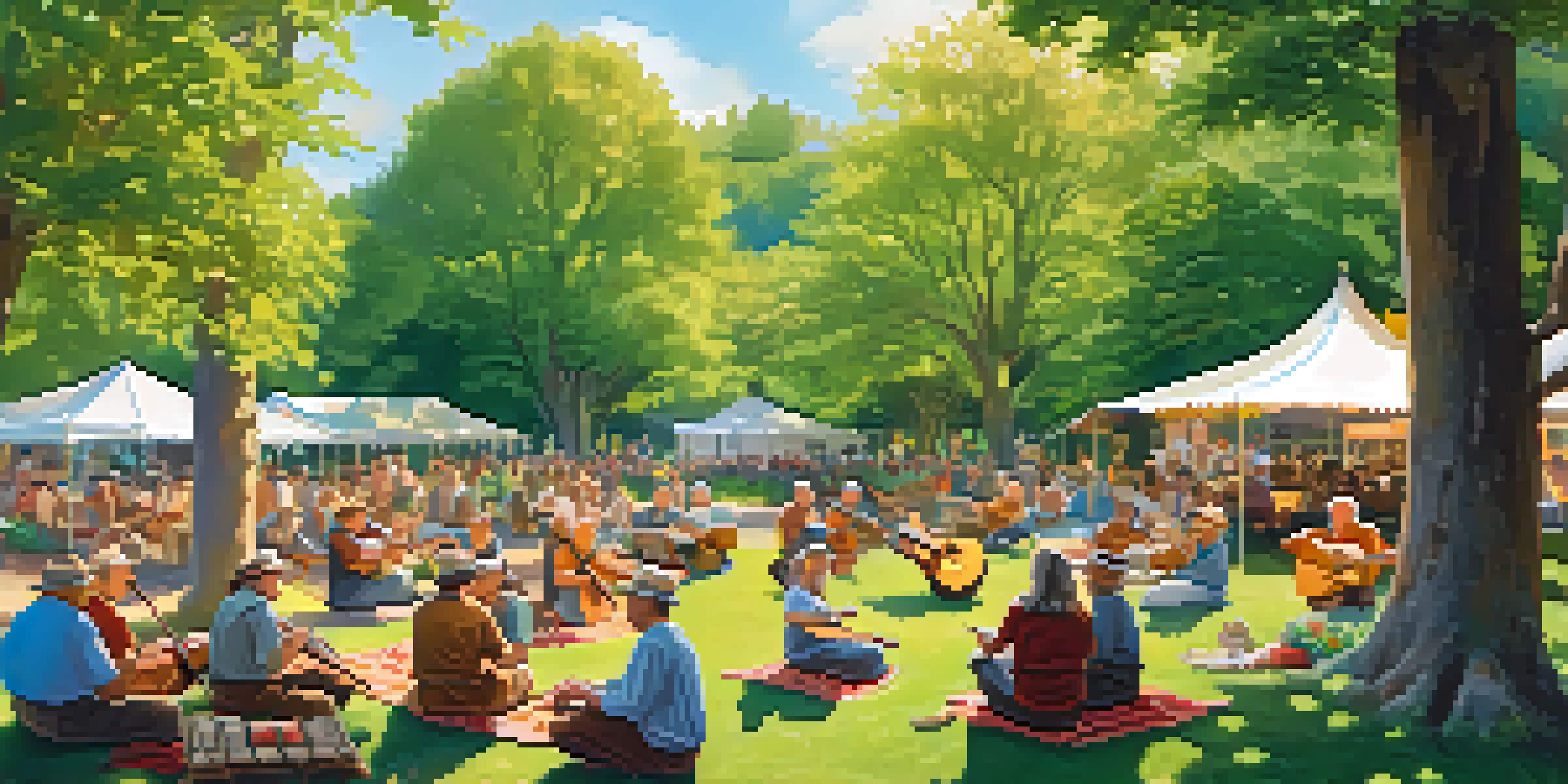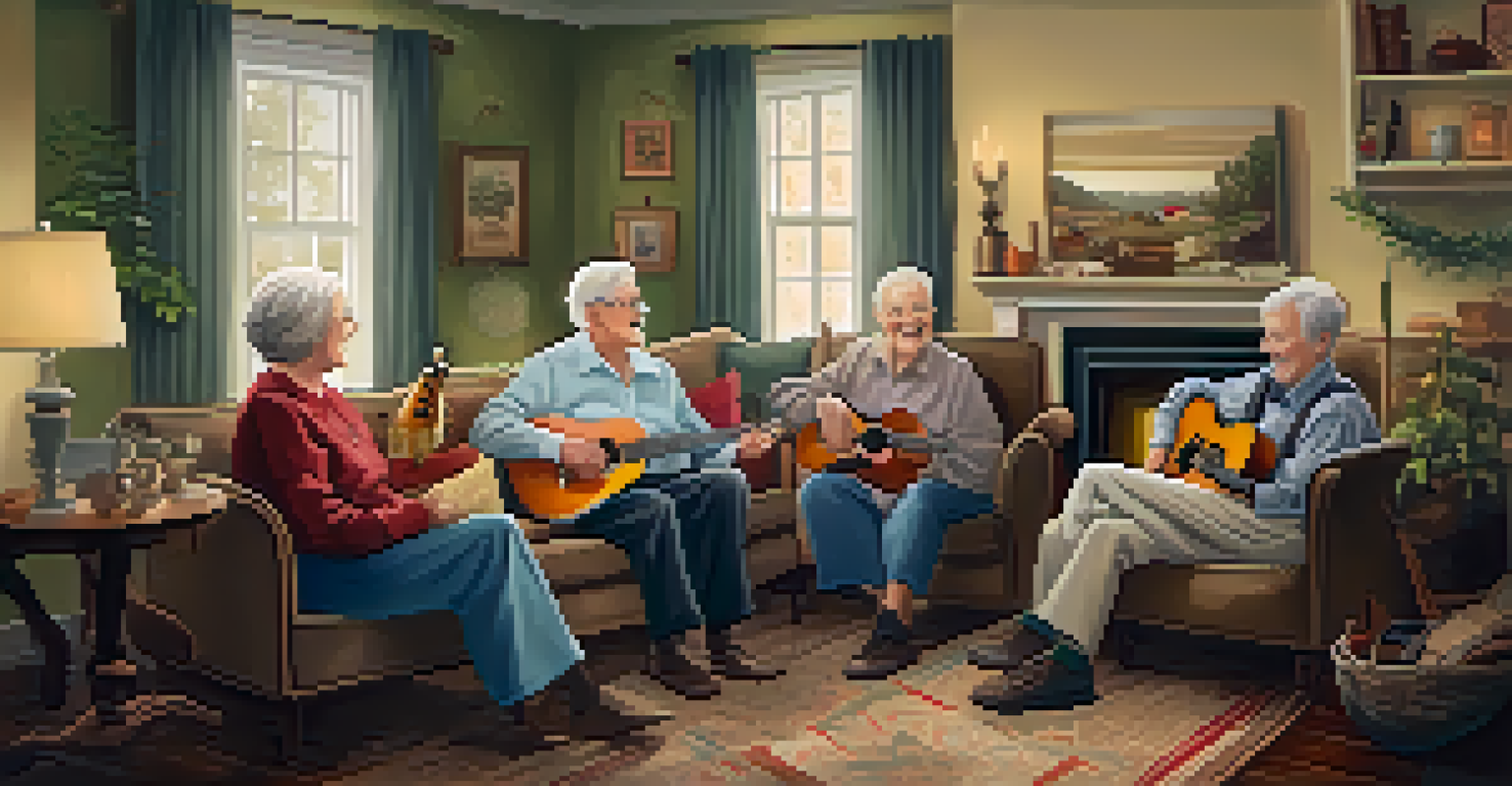Folk Music and Its Impact on Cultural Identity in Seniors

Understanding Folk Music and Its Roots
Folk music is often seen as the heartbeat of culture, reflecting the stories and traditions of a community. It encompasses a wide range of styles and genres, often passed down through generations. For seniors, these tunes may evoke memories of their youth, helping them reconnect with their cultural heritage.
Music can change the world because it can change people.
The roots of folk music can be traced back to the oral traditions of storytelling, where songs were used to convey history and values. This makes it a powerful tool for preserving cultural identity, especially in the face of modern influences. For many older adults, engaging with folk music is not just about nostalgia; it's about maintaining a link to their past.
As seniors listen to or participate in folk music, they often find a sense of belonging and community. These songs can serve as a reminder of shared experiences, creating a bridge between generations and fostering a deeper understanding of one's cultural identity.
The Emotional Connection to Folk Music
Music has a unique ability to evoke emotions, and for seniors, folk music often stirs deep feelings of joy, sadness, and nostalgia. The melodies and lyrics can transport them back to significant moments in their lives, allowing for a rich emotional experience. This connection can be especially important for those facing loneliness or isolation.

When seniors engage with folk music, whether by singing along, playing an instrument, or simply listening, they often feel a sense of release and catharsis. It's as if the music validates their experiences and emotions, helping them navigate the complexities of aging. Through these songs, they can reflect on their life stories and share them with others.
Folk Music Connects Generations
Folk music fosters intergenerational connections by allowing seniors to share their cultural heritage and stories with younger audiences.
This emotional resonance can also lead to improved mental health. Studies have shown that music can reduce feelings of depression and anxiety, making folk music an important tool for uplifting spirits in older adults. By integrating music into their daily lives, seniors can foster a more positive outlook on their cultural identity.
Folk Music as a Tool for Community Building
Folk music often brings people together, creating a shared space for connection and camaraderie. For seniors, participating in community events centered around folk music can foster relationships and reduce feelings of isolation. These gatherings allow older adults to connect with others who share similar backgrounds and experiences.
Folk music is the music of the people, and it’s a way to preserve the culture, history, and values of a community.
Whether it's through local folk festivals, sing-alongs, or workshops, these communal experiences can be incredibly fulfilling. They provide a platform for seniors to express themselves and showcase their cultural heritage. This not only enriches their lives but also strengthens the cultural fabric of the community.
Moreover, folk music can serve as a means of intergenerational connection. When seniors share their musical traditions with younger generations, they create opportunities for storytelling and learning. This exchange not only preserves cultural identity but also builds bridges between ages, enriching the community as a whole.
The Role of Technology in Folk Music Access
In today's digital age, technology has made it easier than ever for seniors to access folk music. Streaming platforms, social media, and online communities allow them to discover new artists and revisit classic songs from their youth. This accessibility can reignite their passion for music and cultural identity.
Online platforms also provide opportunities for seniors to engage with others who share their interests in folk music. Virtual concerts, online forums, and even music-focused social media groups can create a sense of belonging and connection. Seniors can share their own stories and experiences, further enriching their cultural identity.
Emotional Power of Folk Music
Engaging with folk music provides seniors with a profound emotional experience, helping them navigate feelings of nostalgia and connection to their past.
However, it’s essential to recognize that not all seniors may be comfortable with technology. Bridging this gap requires patience and support from family and community members. By providing guidance and encouragement, we can help older adults embrace these new tools without losing touch with their traditional roots.
Folk Music Preservation Efforts
Preserving folk music is crucial for maintaining cultural identity, especially among seniors. Many organizations and initiatives focus on documenting and archiving folk traditions, ensuring that they are not lost to time. These efforts often involve recording oral histories and collecting songs from older generations, creating a rich repository of cultural heritage.
For seniors, participating in preservation efforts can be empowering. It allows them to take an active role in sharing their stories and experiences, ensuring that future generations understand their cultural roots. This sense of purpose can be incredibly fulfilling, reinforcing their identity and value within the community.
Additionally, educational programs that teach folk music to younger generations play a vital role in preservation. By passing down these traditions, seniors contribute to a living history that continues to evolve. This intergenerational exchange not only enriches the lives of seniors but also cultivates appreciation for cultural diversity among younger audiences.
Folk Music's Influence on Personal Identity
For many seniors, folk music is more than just entertainment; it's a vital part of their identity. The songs they grew up with often reflect their life experiences, values, and beliefs. Engaging with this music can reinforce their sense of self and provide comfort during challenging times.
As they listen to or perform folk music, seniors may find themselves reflecting on their life journeys. These musical experiences can evoke memories of significant moments, relationships, and cultural milestones. This reflective process can lead to a deeper understanding of their personal identity and how it relates to their broader cultural background.
Technology Enhances Music Access
Advancements in technology have made folk music more accessible for seniors, enabling them to discover new artists and engage with communities online.
Additionally, the themes often found in folk music—such as love, loss, and resilience—can resonate deeply with seniors. By connecting their personal experiences to the universal themes found in these songs, they can affirm their identity and find strength in their shared humanity.
Conclusion: Celebrating Cultural Identity Through Folk Music
Folk music plays an integral role in shaping and celebrating the cultural identity of seniors. It offers a means of connection to their past, a platform for emotional expression, and a tool for community building. Engaging with folk music can enhance their sense of belonging and purpose, fostering a richer understanding of their cultural heritage.
As we recognize the importance of folk music in the lives of seniors, it's essential to continue supporting initiatives that promote access, preservation, and intergenerational exchange. By doing so, we not only honor the contributions of older adults but also ensure that their cultural stories are woven into the fabric of our communities.

Ultimately, folk music is more than just a genre; it's a celebration of identity and a reminder of the stories we all share. By embracing these musical traditions, we create a vibrant tapestry of culture that honors the past while inspiring future generations.